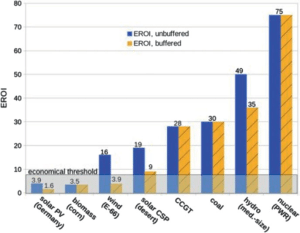An Engineering Critique of Climate Policy
Much of what has been the policy prescription for global warming from greens and the left – a 100% renewable energy system based on cheap solar and wind generation, low-cost storage, and policies for managing consumer demand — which might be characterized as “decarbonization” – is likely to fail and make matters worse. That’s the conclusion of a recent paper in the peer-reviewed journal MRS Energy & Sustainability, written by M.J. Kelly, an electrical engineering professor at the University of Cambridge in the U.K.

the bottom. The advantages of fossil fuels and nuclear energy are very clear.
Kelly’s 13-page engineering analysis has drawn comment from veteran Georgia Tech climatologist Judith Curry, generally characterized as a climate skeptic, and my colleague Robert Marritz, a green-all-the-way advocate at ElectricityPolicy.com. In an editorial, Marritz commented, “Reading the paper was unsettling for me because it challenges—methodically and without polemic—not just my own views but those underlying the vision of an energy future that much of the thinking world has subscribed to. That vision—that increasingly cheap renewable energy, paired with affordable storage, demand response, and transactive energy will allow the world to arrest climate change while serving a population of 9 billion and a middle class perhaps half that size with clean energy by mid-century—is directly challenged by Prof. Kelly’s paper.”
As someone who has followed the global warming issue from the early 1980’s (pre-Jim Hansen) and viewed the science with considerable skepticism, I find Kelly’s engineering approach persuasive. When Rep. Al Gore, a junior member of the House Science and Technology Committee in the early 1980’s orchestrated a hearing on global warming, the consensus of the witnesses, including Gore’s mentor Roger Revelle, basically said the only realistic response to global warming, if it was real, was adaptation. Gore wasn’t happy with that judgment.
That was an engineering assessment, and Gore was looking for a political response, a global regulatory regime to combat warming. His approach, including the Kyoto Protocol and the later Paris agreement, has failed, although it has advanced the implausible notion that wind, solar, storage, and coercion of consumers can solve the problem.
Almost 20 years after the Kyoto failure, Kelly, looking at the “decarbonization” movement, said, “I am sure that what has been done so far in the name of decarbonization is set to fail comprehensively in meeting its avowed target, and that a new debate is needed.”
Kelly’s fear, which I have long shared, is that the green renewables agenda will sentence billions of humans in undeveloped countries to poverty and starvation, due to a lack of electricity. While so-called clean energy technologies are promising, they are far from mature and competitive with conventional technologies for providing the energy poor and developing countries need. Pushing them into the market, Kelly argues, “is a recipe for failure.”
He cites, among other evidence, the roll-out of electric cars. “The batteries for these cars are very bulky, and in the quest for ever increasing energy density, materials of greater intrinsic instability are used: electrodes swell and shrink during charge and discharge, each time weakening the overall structure. The materials tend to be rich in oxygen, and any small rupture in an internal membrane caused by a minor impact can lead to short-circuits through flammable electrolytes which over time can erupt as a fiercely burning fire, an intolerable side effect.”
To date, argues Kelly, the decarbonization cause has shown slim results at best. “No serious inroads have been made into the lion’s share of energy that is fossil fuel based,” he writes. “Some moves represent total madness.” He cites closure of the U.K.’s aluminum smelting industry, a result of high costs of “green tariffs.” So U.K. companies now import aluminum from China, “where it is made with more primitive coal-based sources of energy, making the problem of emissions worse!”
Kelly argues that “humanity is owed a serious investigation of how we have gone so far with the decarbonization project without a serious challenge in terms of engineering reality. Have the engineers been supine and lacking in courage to challenge the orthodoxy? Or have their warnings been too gentle and dismissed or not heard?”
Judy Curry commented, “When I have spoken with engineers at Georgia Tech, nearly all of them question the feasibility of a rapid transition away from fossil fuels (the ones that don’t question this have been civil/environmental engineers). First it was the scientists, then the economists. It is now time for the engineers to drive the discussion and policies on this issue.”